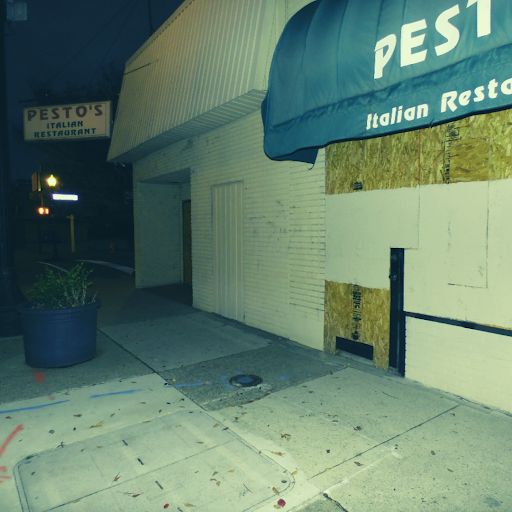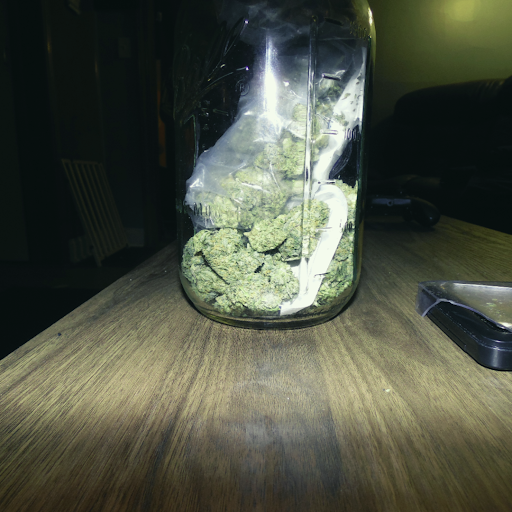“Thought It Was a Drought”: Weed Dealers in Louisville Are Struggling in the Pandemic
Pesto’s in Louisville is one of the many businesses that shut down as a result of the pandemic and protests. All photos provided by Qhai Muhammad
The weed game in Louisville, Kentucky has undergone a transformation. The COVID-19 pandemic hit the city hard. New restrictions dropped each week, all the bars closed, and by May, 1 in 3 Kentuckians were unemployed.
In June the unimaginable happened: I couldn’t find any weed. The city was completely dry. My requests were either ignored or met with “I don’t have it.” Since then, things have gotten slightly better. But the local industry, as it stands now, is a far cry from the bountiful pre-COVID landscape. I wanted to find out more about how and why the weed market changed for local dealers during the pandemic. So I reached out to every dealer in my phone in hopes of getting some answers.
Five responded to me—begrudgingly. Fearful that they’d renege, I set up phone calls right away. By the end of each conversation, I identified some common themes. After talking to Teddy, Ralph, Wes, Jen, and Meek (five local dealers referred to by their nicknames), here’s what I was able to gather about the changes in Louisville’s weed scene.
Price Gouging
Everyone agreed that the price of weed has gone up during the pandemic. The days of $30 eighths are no more. Average prices for marijuana in the city have spiked at least 50% since COVID-19 struck in March. The same weed once priced at $10 a gram is now sold for $15-$20 a gram.
For lower-level dealers like Wes, the price increase isn’t worth doing business anymore. Wes had been one of my go-to dealers prior to the pandemic. In August, he shifted focus and told me that he was closing up shop. Wes is a fitness trainer and health enthusiast who has turned to selling weed intermittently over the years. During our call, he told me that “It’s rough out here for us little guys.. an ounce I used to pay like $250 for, and now I’m paying anywhere upwards of $280. It’s not worth the hassle.”
Teddy shows the remainder of a quarter-pound (about two ounces) of weed and the anti-humidity pack it was mailed with.
Wes’s experience highlights an issue that many “little guys” are facing. Out-of-pocket costs and the hassle that comes with raising prices on loyal clientele isn’t worth the stress. Another obstacle is the reluctance to ‘front’ amongst dealers. Teddy is a considerably larger dealer than Wes—moving about a pound each month by himself. One of Teddy’s biggest changes in operation has been his refusal to front ounces to lower level dealers like Wes. “Nah, I had to stop that...with unemployment how it is, motherfuckas don’t have that cushion. I can’t depend on them to have my money,” Teddy stated plainly. The ‘little guy’s’ exit from the game has created a gap in access to weed for the average person—the neighborly, friendly ‘plug’ that most smokers rely on is harder to find.
The bigger question remained unanswered: why is the price of weed going up? To find out, I went the OG route. Born and raised in the Newburg neighborhood, ‘Mr. Jen’ has knowledge and ties with major players in the city’s drug scene that spans over three decades. He claimed that it all stems from scarcity. But ironically enough, it wasn’t the weed that was scarce.
Jen attributed the initial price increase to border closings, travel restrictions, and mailing delays early on in the pandemic—most notably the Department of Homeland Security’s decision to limit non-essential travel between the US & Mexican border on March 23rd. Jen explained that the closing of the border instantly cut the volume of heroin, fentanyl, and meth imported to California and Texas from Mexico. He said that in turn, West Coast plugs increased prices on weed shipments in an attempt to compensate for profit losses caused by the shortages of other, harder drugs.
[“People Just Went Crazy”: How One Prison Dealt With Coronavirus]
Jen believes that increased shipping times and prices created a monopoly here locally—where the few who actually did have the weed, stalled on moving it in fear of garnering police attention or becoming robbery targets. “There’s always weed in the city,” he said curtly. “There’s never going to be 0 drugs [in any given] area. Now whoever is holding onto them might not be moving them at the time, but it’s there.”
Fake Dispensary Bags and the Rise of Exotic
There’s something else raising the prices. Although weed is easier to find than when the pandemic began, the prices remain high. Ralph knows why.
Ralph, full-time rapper and trapper, is one of the most eccentric people that I’ve come across. When he’s not posting Trillers to his own music on instagram, he’s trapping out of the homes of Baby Boomers on disability (that’s Kentucky for you). Ralph speaks in riddles. His cadence makes it difficult to tell when he’s finished a thought. “Make it make sense!” he said excitedly in response to almost all of my questions.
Over the summer, the popularity of the sealed bags skyrocketed. As weed started to trickle back into the city, repackaging it in dispensary-style bags became the go-to method for maintaining that inflated price. Ralph described a method that every dealer I spoke with was either familiar with, or is currently utilizing. “If you don’t have a pretty bag to flex your weed in, then what the fuck are you doing in 2020?” Ralph exclaimed. “Niggas don’t wanna ride around with a clear plastic bag that looks like drugs. Make it make sense...presentation is everything, just like matching bras and panties.”
One of the ‘fake’ dispensary bags dealers are repackaging their buds in.
Teddy, who I mentioned earlier, is also familiar with the repackaging trend. I’d describe him as the guy who your neighborhood dealer calls when they want to re-up. Teddy recognized that the fake dispensary packaging is a ploy to maintain higher weed prices, but he’s not a fan. Where Ralph looked at the phenomenon as marketing and rebranding, Teddy considers it scamming. He says that “As soon as you put weed in that [dispensary] bag, a $30 [eighth] goes to $50-65 immediately...it’s still good weed, but it’s not worth what you’re paying for it. Everybody doesn’t have that caliber of resources and sourcing to get ‘real’ exotic. They’re getting those bags online.”
Police Games
Law enforcement is another area where dealers are being forced to adapt—especially in the wake of civil unrest. Meek had an interesting take on this. Meek is a mild-mannered spiritual consultant and apothecarist who sells weed-infused treats on the side. She lives in Elizabethtown (E-Town), a rural area about 40 minutes away from Louisville Metro. When I asked Meek if the Breonna Taylor protests that took place in the middle of the pandemic had any effect on the way that she vets prospective clients, she said: “Yes, I try to stay away from white people, especially white men. I also don’t add people I don’t recognize on Snapchat. I didn’t sell to anyone who didn’t have a public appearance on social media. I’ve had what I suspected are undercover [officers] in my inbox on Snapchat trying to add me out of the blue with weird names and [unreasonably low weed prices].”
Meek’s apprehension towards law enforcement was to be expected. But, Wes and Teddy had a different take. They believe that a sense of lawlessness and recklessness has taken over amongst dealers. In their opinion, the police department that killed Breonna Taylor (the LMPD) has surprisingly been less of a threat and nuisance to local dealers since both the pandemic and protests.
[How the CIA Helped Create the First Mexican Cartel: On Amazon's "The Last Narc"]
In March, LMPD announced that they would no longer be responding to a number of non-emergency calls due to COVID-19. Teddy believes that police stopped pulling people over for petty offenses from March through July, when protests hit their peak. Teddy said, “I hate to phrase it like this, but the protests helped a lot of [people]. They weren’t worried about drugs or expired licenses...it was a free-for-all. I’ve taken a few trips out of town and driven [weed] back home with no issue. I wouldn’t be able to do that before the pandemic. I’ve flown out of town and mailed shit back to myself with no questions asked...everybody’s relaxed on me.”
The pandemic has brought some significant changes to the game. To my surprise though, the COVID-19 virus itself was considered to be the least intrusive of those changes. The societal changes that followed COVID-19—the US-Mexico border shutdown, the rise of fake dispensary bags, and disruption of law enforcement— are what took the forefront.
Teddy, Ralph, Jen, and Meek all alluded to CDC’s recommendations on COVID-19 when I asked them about any precautions that they take. Masks and non-contact delivery. Pretty straightforward. As Jen so beautifully put it: “At first we were just spraying the money down with lysol. You do what you can. The streets have been on CDC guidelines.”
Follow Qhai Muhammad on Instagram.



